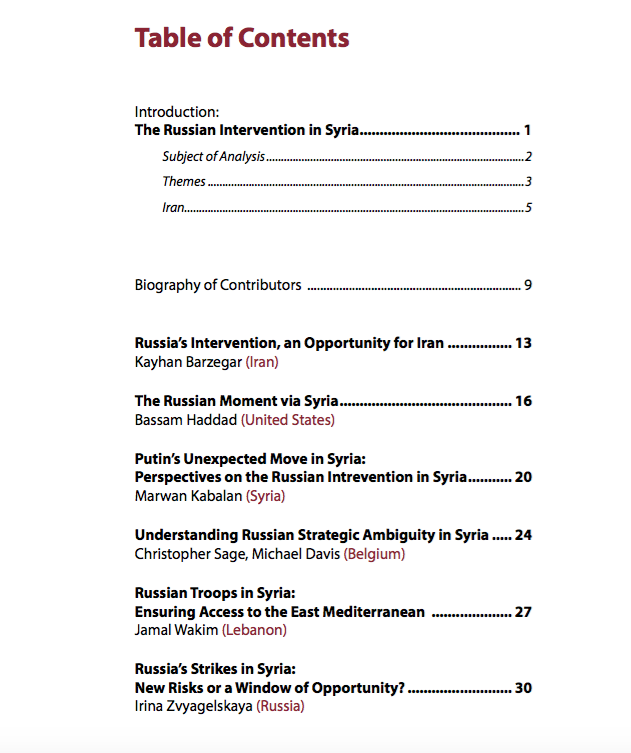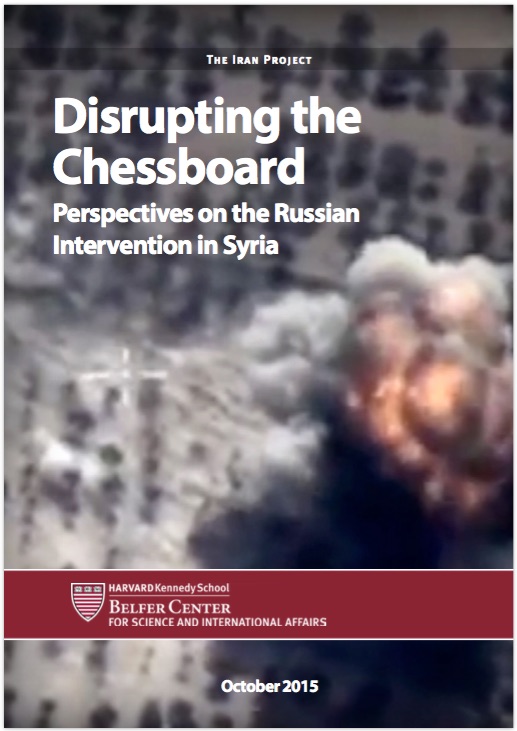Disrupting the Chessboard: Perspectives on the Russian Intervention in Syria
Introduction: The Russian Intervention in Syria
Payam Mohseni, Editor
In late September 2015 at the request of the Syrian government, dozens of advanced Russian warplanes entered Syrian airspace and began conducting intensive airstrikes against enemy targets. With the support of the Russian Air Force, the Syrian government also launched an offensive ground campaign in conjunction with Hezbollah and Iranian forces to recapture key territories in Hama, Idlib, and Latakia provinces and has more recently set its objectives on regaining Aleppo. Moreover, Iran, Iraq, Russia, and Syria established a joint intelligence center in Baghdad to coordinate military and strategic cooperation across the multiple battlefronts in Syria and Iraq. The Iraqi Prime Minister has further expressed interest in having the Russians extend their aerial bombardment to Iraq as well.
These striking developments were met with both surprise and condemnation by the United States and its allies. The European Union called for an immediate cessation of Russian airstrikes, with EU foreign policy chief Federica Mogherini calling the Russian intervention a “game changer” in the conflict. Likewise, President Barack Obama, while insisting upon Bashar al-Assad’s removal for any future political settlement, claimed Russia was heading for a “quagmire” in Syria.
Various narratives explaining Russia’s recent decision have emerged which portray Russia alternatively as attempting to re-establish its role as a world empire or as a power-balancer protecting its interests in the Middle East. This publication aims to present different scholarly perspectives and viewpoints on Russian objectives in Syria and the implications it holds for world politics. It does so by gathering the opinions of several experts with different backgrounds and analytic viewpoints from across the world.
Subject of Analysis
Russia’s recent decision to militarily intervene in Syria is a very significant development in the history of the conflict and holds multiple ramifications for international and regional politics. To analyze these potential implications, we asked seven experts from across the world to provide commentaries on the subject. Our contributors are located in Russia, Iran, the Arab world, the EU, and the US. As such, this report provides a unique snapshot of different perspectives that exist on the topic and attempts to bring the views into a dialogue with one another to attain greater insights on the matter.
Specifically, we asked our contributors to respond to the following two questions:
- What are Russian objectives for intervening in Syria?;
- What are the implications of this decision for the Syrian conflict, as well as regional and international politics more broadly?
The answers we received were of course diverse and reflected different positions on the factors driving the Syrian conflict. The full report edited by Payam Mohseni is available for download on the Belfer Center’s website here.
Click here or on image below to access the full report
The Russian Moment via Syria
Bassam Haddad
[Director of the Middle East Studies Program and Associate Professor, School of Policy, Government, and International Affairs (SPGIA) at George Mason University]
There are several factors at play that complicate the Syrian crisis. True, Syria is a pivotal regional player that has brought in the world powers into the conflict, making the Syrian uprising-turned-civil war much more than just about Syria. This much has become clear, even for latecomers who were fixated exclusively on the local dimensions of a revolution-against-dictatorship narrative. The fact remains that the Syrian case is enmeshed in a web of local, regional, and international tensions, aspirations, and contradictions, which makes it difficult to disentangle motives and identify causality.
Thus, things are not always what they appear.
Before addressing Russia’s recent and ongoing intervention, we should address the outrage or shock one reads in mainstream media. The Russian direct participation now puts on an equal footing the categorical local, regional, and international forces on both sides (i.e., in relation to US direct participation, for other regional interventionists existed on both sides). Further, being outraged or disconcerted about the Russian intervention in this one arena is to take the United States’ multiple and brutal interventions in the entire region for granted as the norm. There is little that should turn heads about this recent development.
Much has been written already about the motives for the intervention. Beyond the proclaimed cause regarding fighting ISIS—a reasonable rationale but also a most convenient cover for a host of motives—one can cite the basic desire to keep the regime afloat in order to strengthen its potential bargaining position after recent setbacks. Other reasons range from Russia’s desire to divert attention from what is happening in it’s own neighborhood to its desire to assert its loyalty to it allies.
Though these, and other analyses all contain more than a grain of truth, they intersect with what can be called the “forced Russian moment” whereby the Russian leadership are trying to establish its intervention in Syria as a crown on the country’s ascension to global power. Whether it results in a dangerous showdown in the context of brinkmanship or simply sets new terms for an alter- native balance of power in the region, Russian decision-makers determined that the Syrian crisis happens to be the time and place for such an advance, and it comes at the right time when Russia is content to distract from its own adventures close to home. No matter the analysis, Syria is a vehicle, not a goal, for Russia. China is watching and not disagreeing.
The rationale for the current active leap cannot possibly be the same as that of simply supporting the regime in its fight, as this conflict has long turned into something of international proportions. It is facile to explain this direct intervention as a response to the US intervention in its relatively mild campaign against ISIS. But the Russians are not interested in ISIS as much as they are interested in the regime’s tenure and much more in its own regional and international clout. ISIS and similar groups can be, and at times have been, a godsend for the Syrian regime in its own propaganda war regarding the nature of the uprising, even its first moments.
Russia’s decision is also not simply a calculated move to avoid a complete tipping of the balance in favor of the “opposition,” even if this is part of the rationale. Such a concern could have been served in a far less risky manner by taking defensive positions along the coastal lines and elsewhere, thereby justifying retaliation to potential attackers. The main purpose of the Russian plan was not, or is not, simply to preserve the regime’s existing territorial control, and I argue, nor is it to regain lost territory—though this may well be one of the results with the aid of other forces, including Iranian ones, on the ground. Rather, this is likely to be an attempt to establish a Russian moment, however premature and rushed, deliberated by a president that is eager to restore, aggrandize, and/or be heard loud and clear in a slowly emerging kind of world where the global economic- and power-pie seems to be less and less dominated by a single power and, ironically, more and more democratically distributed. The Russian objective is to test the waters a bit using a particular rationale that has some legitimacy worldwide: fighting ISIS.
This is partly why there will be no magnificent outrage, in the region or beyond, however much we hear roars and threats, so long as the campaign does not disempower the US and its regional allies. Fears of a new cold war are certainly premature. Also exaggerated are fears of an immediate military confrontation that was resolved almost two years ago when the United States was no longer, if it ever was unequivocally, interested in an Assad-less Syria.
The ramifications of the Russian intervention are difficult to assess at this early state. However, they will depend less on the intensity of the participation and more on who is being targeted. The less ISIS is the object of the bombardment, the more likely that the intervention will complicate matters, especially if the Russian operations provide an entry point for regime and pro-regime forces into territories lost by the regime in recent months. The United States will wait before it acts, but one ought not take for granted US docility under changing circumstances on the ground. The same might apply to China.

